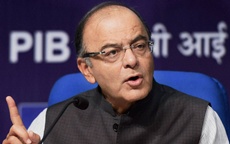Shadow economy cannot be allowed to undermine real economy: Jaitley
30 Oct 2017
Finance minister Arun Jailtley has called the bluff of the defenders of shadow economy and the critics of note ban saying that tax-paying is a "patriotic duty", given our aspiration to be a dominant player on the world stage.
 | |
| Arun Jaitley |
"You can't have an economy where the size of the shadow economy is much bigger than the apparent economy itself," Jaitley said at the ET Awards in Mumbai on Saturday evening.
Addressing the awards function, he said the government has been taking steps towards a cleaner economy, and that these have helped enlarge the tax base and reduce illicit cash transactions.
He did not specify the steps taken like the note-ban and the GST rollout, which critics blame for allegedly slowing down the economic engine, but said these have in fact set the stage for a cleaner economy. The economy is now in a better position to achieve the aspirations like being a developed economy and the fastest growing among major economies of the world, he said.
Jaitley, however, conceded that the implementation of the goods and services tax has not been smooth and that there has been some "noise and grievances" because of the way it was implemented.
"Paying taxes is always a fundamental duty of every citizen. It's a patriotic duty to be a part of that structure, rather than outside the structure. It is only then that the implementation will really show its larger, longer-term impacts," he said.
It can be noted that the note-ban and the hasty rollout of GST are the main reasons for the sluggish growth, with the GDP growth falling for sixth straight quarters to 5.6 per cent in the June quarter.
Without mentioning any specific criticism, he asserted that tax rates in the country are the lowest in the world and added that this will help the agenda of widening the tax base.
On direct taxes side, he said government has reduced them in such a way where the lowest tax slab is 5 per cent, while on the indirect tax side, it is as low as 1 per cent.
He also said the process of structural reforms has a long way to go and that that government has grabbed a lot of low hanging fruits, like increasing FDI caps in multiple sectors.
Terming the introduction of the Insolvency and Bankruptcy Code as a "belated reform" he expected the measure to bear fruits going forward.
Claiming that government is "extremely transparent" when it comes to banking matters he said he wants a system which shows the true health of the system.
"Our banks have lent excessively. And while we were lending excessively, we were through the various restructuring processes of evergreening those loans. Till 2015, nobody knew what the real picture was. The real picture was hidden below carpet. No economy can really survive if the main source of finance is in such non-transparent position itself," he said.



















